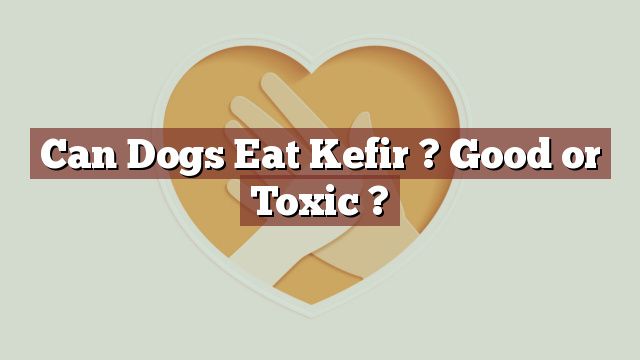Can Dogs Eat Kefir? Good or Toxic?
Ensuring the safety of the food we offer to our canine companions is of utmost importance. Dogs have different dietary requirements compared to humans, and not all foods that are safe for us are safe for them. One such food that often raises questions is kefir. In this article, we will delve into the nutritional value of kefir, discuss its safety for canine consumption, examine any potential risks or benefits, and provide guidance on what to do if your dog eats kefir.
Nutritional Value of Kefir: A Rich Source of Beneficial Microorganisms and Essential Nutrients
Kefir is a fermented milk drink that originated in the Caucasus region. It is made by adding kefir grains to milk, which then undergoes fermentation. This process results in a tangy and slightly carbonated beverage that is rich in beneficial microorganisms and essential nutrients.
Kefir is known to be a great source of probiotics, which are beneficial bacteria that contribute to a healthy gut flora. These probiotics can help improve digestion, boost the immune system, and support overall gut health in dogs. Additionally, kefir contains vitamins such as vitamin B12, calcium, and phosphorus, which are essential for maintaining healthy bones and teeth.
Can Dogs Eat Kefir? Understanding its Safety and Toxicity for Canine Consumption
Yes, dogs can eat kefir. In fact, many veterinarians recommend it as a part of a balanced diet for dogs. Kefir is generally safe for canine consumption, as long as it is given in moderation and does not contain any additives or sweeteners that can be harmful to dogs.
However, it is important to note that not all dogs may tolerate kefir well. Some dogs may have lactose intolerance or dairy allergies, which can cause digestive issues such as diarrhea or upset stomach. It is recommended to introduce kefir gradually and observe your dog’s reaction to ensure they can tolerate it.
Potential Risks or Benefits of Dogs Consuming Kefir: Examining the Evidence
The potential benefits of dogs consuming kefir are vast. As mentioned earlier, the probiotics present in kefir can improve digestion and boost the immune system. They can also help alleviate symptoms of gastrointestinal issues such as diarrhea and constipation. Additionally, the vitamins and minerals in kefir contribute to overall health and well-being in dogs.
However, it is important to note that excessive consumption of kefir can lead to an imbalance in the gut flora and cause digestive issues. This is why moderation is key when offering kefir to your dog. It is also essential to choose plain, unsweetened kefir without any added flavors or sweeteners, as these can be harmful to dogs.
What to Do if Your Dog Eats Kefir: Monitoring, Symptoms, and Seeking Veterinary Assistance
If your dog accidentally consumes kefir or you have introduced it into their diet and notice any unusual symptoms, it is important to monitor their condition closely. Common symptoms of an adverse reaction to kefir may include diarrhea, vomiting, or excessive gas.
If your dog experiences any of these symptoms or if they persist for an extended period of time, it is highly recommended to seek veterinary assistance. A veterinarian will be able to assess your dog’s condition and provide appropriate guidance and treatment if necessary.
Conclusion: Dogs and Kefir – Weighing the Potential Benefits against the Risks
In conclusion, dogs can safely consume kefir as part of a balanced diet. Kefir offers numerous potential benefits, such as improved digestion, boosted immune system, and overall gut health support. However, it is crucial to introduce kefir gradually and monitor your dog’s reaction to ensure they tolerate it well.
Remember, moderation is key when offering kefir to your dog, and it is important to choose plain, unsweetened kefir without any additives. If your dog experiences any adverse symptoms after consuming kefir, seek veterinary assistance promptly.
By understanding the nutritional value, safety, and potential risks of kefir, we can make informed decisions about including it in our dog’s diet. Always prioritize your dog’s well-being and consult with a veterinarian if you have any concerns about their dietary needs.
Thank you for investing your time in exploring [page_title] on Can-Eat.org. Our goal is to provide readers like you with thorough and reliable information about various dietary topics. Each article, including [page_title], stems from diligent research and a passion for understanding the nuances of our food choices. We believe that knowledge is a vital step towards making informed and healthy decisions. However, while "[page_title]" sheds light on its specific topic, it's crucial to remember that everyone's body reacts differently to foods and dietary changes. What might be beneficial for one person could have different effects on another. Before you consider integrating suggestions or insights from "[page_title]" into your diet, it's always wise to consult with a nutritionist or healthcare professional. Their specialized knowledge ensures that you're making choices best suited to your individual health needs. As you navigate [page_title], be mindful of potential allergies, intolerances, or unique dietary requirements you may have. No singular article can capture the vast diversity of human health, and individualized guidance is invaluable. The content provided in [page_title] serves as a general guide. It is not, by any means, a substitute for personalized medical or nutritional advice. Your health should always be the top priority, and professional guidance is the best path forward. In your journey towards a balanced and nutritious lifestyle, we hope that [page_title] serves as a helpful stepping stone. Remember, informed decisions lead to healthier outcomes. Thank you for trusting Can-Eat.org. Continue exploring, learning, and prioritizing your health. Cheers to a well-informed and healthier future!

